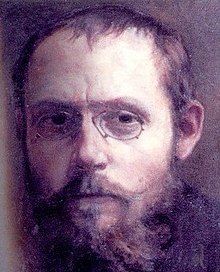Charles Péguy
French poet, essayist, and editor (1873–1914)
(Redirected from Charles Peguy)
Charles Péguy (January 7, 1873 – September 4, 1914) was a French poet, socialist activist and essayist.

Quotes
edit- There will be things that I do that no one will be left to understand.
- Le Mystère des saints Innocents [The Mystery of the Holy Innocents] (1912)
The Portal of the Mystery of Hope (1912)
edit- Le Porche du mystère de la deuxième vertu, trans. David Louis Schindler Jr., 1929
- In my servant the ant, my tiny servant, who hoards greedily like a miser.
Who works like one unhappy and who has no break and who has no rest.
- I am so resplendent in my creation.
That in order really not to see me these poor people would have to be blind.
- Faith is a loyal Wife.
Charity is a Mother.
An ardent mother, noble-hearted.
Or an older sister who is like a mother.
Hope is a little girl, nothing at all.
Basic Verities, Prose and Poetry (1943)
edit- Charles Péguy: Basic Verities, Prose and Poetry, trans. Ann and Julien Green (1943)
- He who does not bellow the truth when he knows the truth makes himself the accomplice of liars and forgers.
- "Lettre du Provincial" (21 December 1899)
- The sinner is at the heart of Christianity. No one is as competent as the sinner in matters of Christianity. No one, except a saint.
- "Un Nouveau théologien" (1911)
- The life of the honest man must be an apostasy and a perpetual desertion. The honest man must be a perpetual renegade, the life of an honest man must be a perpetual infidelity. For the man who wishes to remain faithful to truth must make himself continually unfaithful to all the continual, successive, indefatigable renascent errors. And the man who wishes to remain faithful to justice must make himself continually unfaithful to inexhaustibly triumphant injustices.
- p. 51
- Dans ce bel honneur de métier convergeaient tous le plus beaux, tous le plus nobles sentiments. Une dignité. Une fierté. Ne jamais rien demander à personne, disaient-ils. … Un ouvrier de ce temps-là ne savait pas ce que c’est que quémander. C’est la bourgeoisie qui quémande. C’est la bourgeoisie qui, les faisant bourgeois, leur a appris a quémander.
- Work for them was joy itself and the deep root of their being. And the reason of their being. There was an incredible honor in work, the most beautiful of all the honors. … We have known this devotion to l’ouvrage bien faite, to the good job, carried and maintained to its most exacting claims. … Today, what remains of all this? How has … the only people that loved to work … been transformed into one which in the workyard takes the greatest pains not to lift a hand?
- p. 81
- Work for them was joy itself and the deep root of their being. And the reason of their being. There was an incredible honor in work, the most beautiful of all the honors. … We have known this devotion to l’ouvrage bien faite, to the good job, carried and maintained to its most exacting claims. … Today, what remains of all this? How has … the only people that loved to work … been transformed into one which in the workyard takes the greatest pains not to lift a hand?
- These bygone workmen did not serve, they worked. They had an absolute honor, which is honor proper. A chair rung had to be well made. That was an understood thing. That was the first thing. It wasn’t that the chair rung had to be well made for the salary or on account of the salary. It wasn’t that it was well made for the boss, nor for connoisseurs, nor for the boss’ clients. It had to be well made itself, in itself, for itself, in its very self. A tradition coming, springing from deep within the race, a history, an absolute, an honor, demanded that this chair rung be well made. Every part of the chair which could not be seen was just as perfectly made as the parts which could be seen. This was the selfsame principle of cathedrals. … There was no question of being seen or of not being seen. It was the innate being of work which needed to be well done.
- p. 82
- Towards this fine honor of a trade converged all the finest, all the most noble sentiments—dignity, pride. Never ask anything of anyone, they used to say. … In those days a workman did not know what it was to solicit. It is the bourgeoisie who, turning the workmen into bourgeois, have taught them to solicit.
- p. 83.